
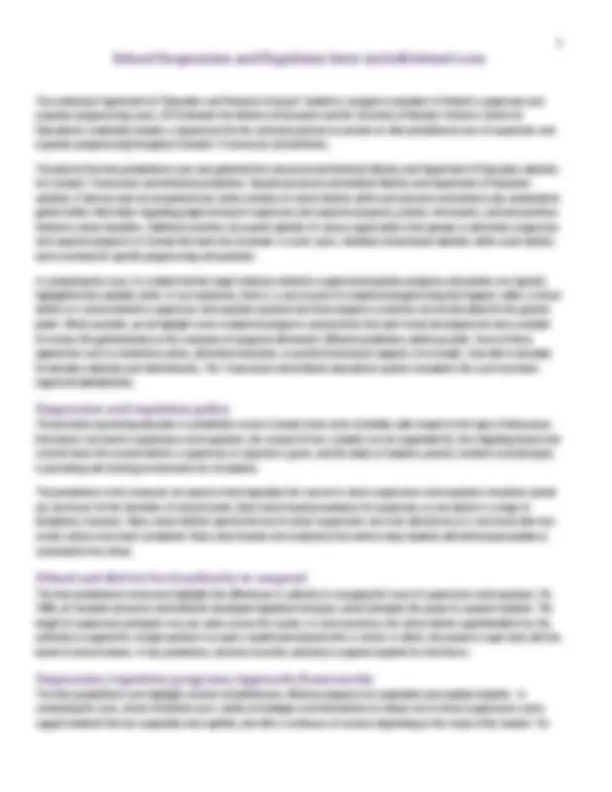
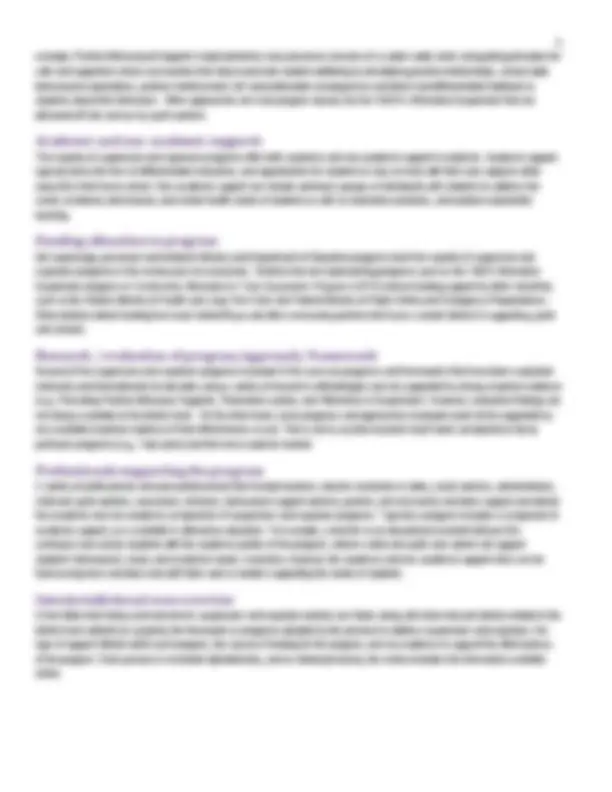

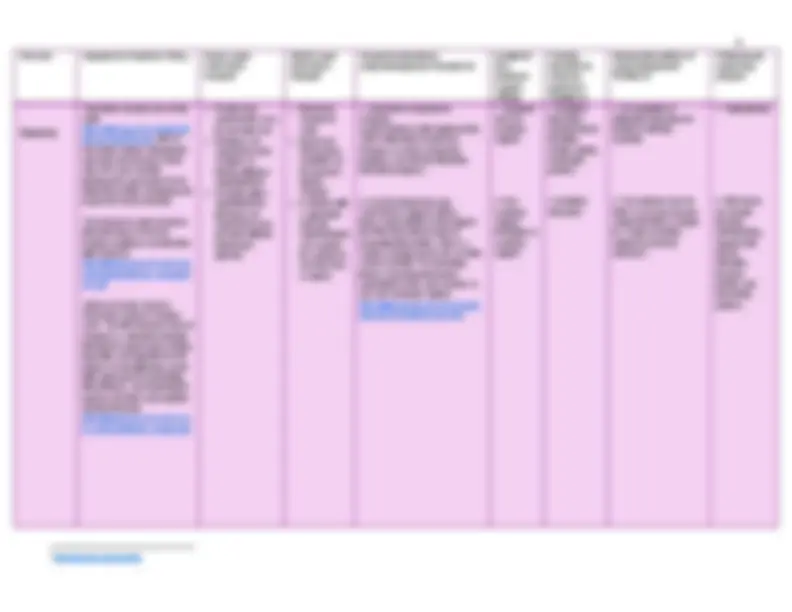
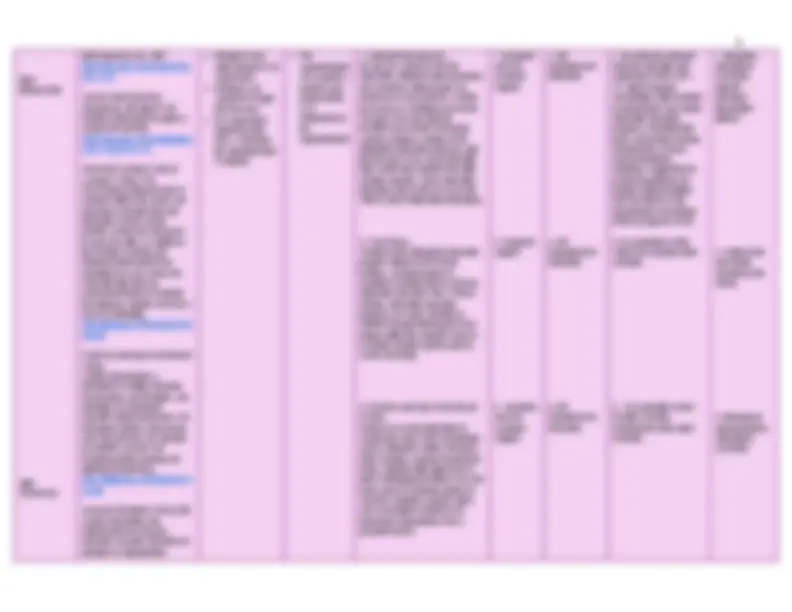
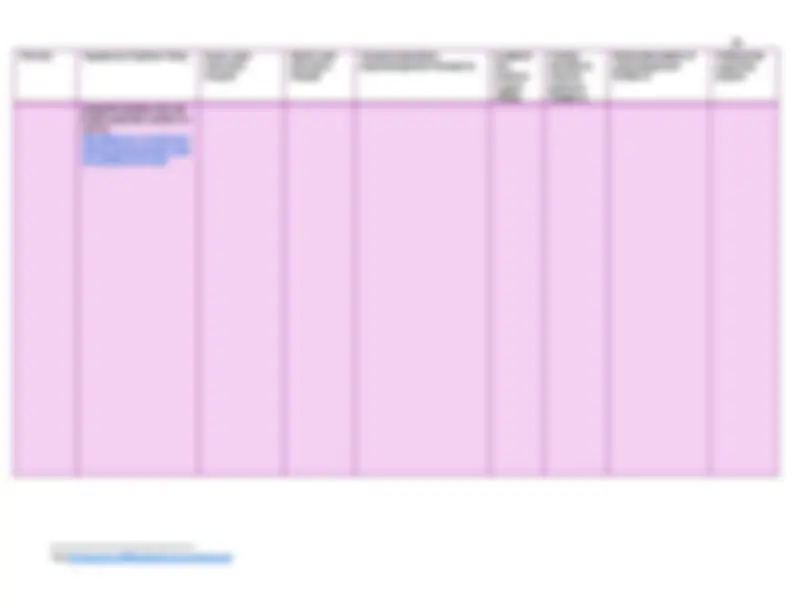
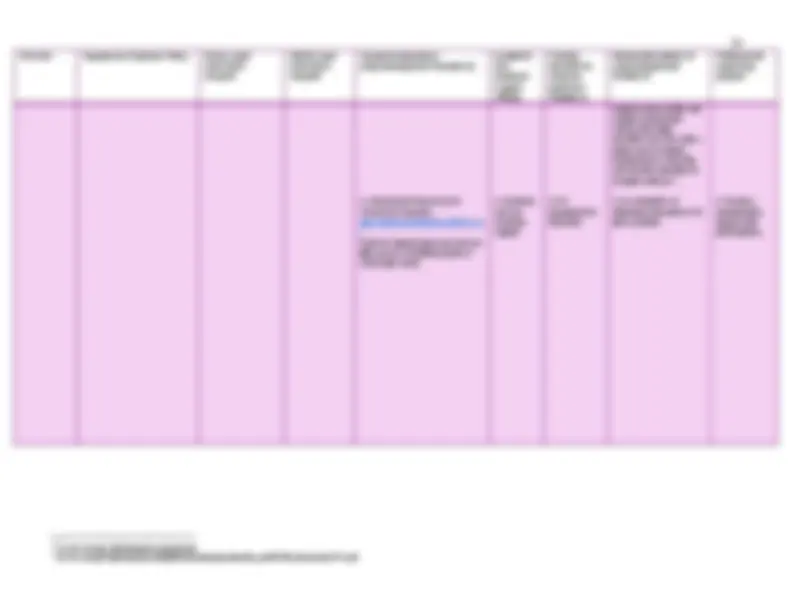
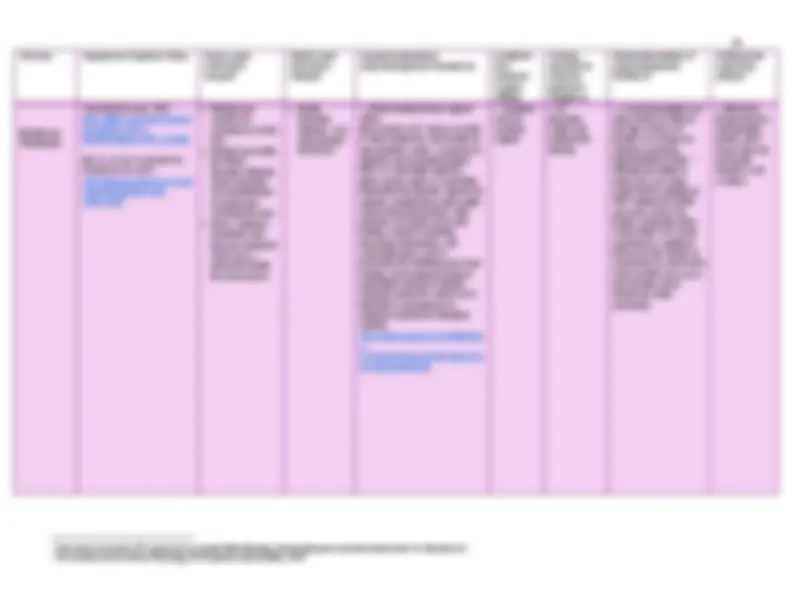
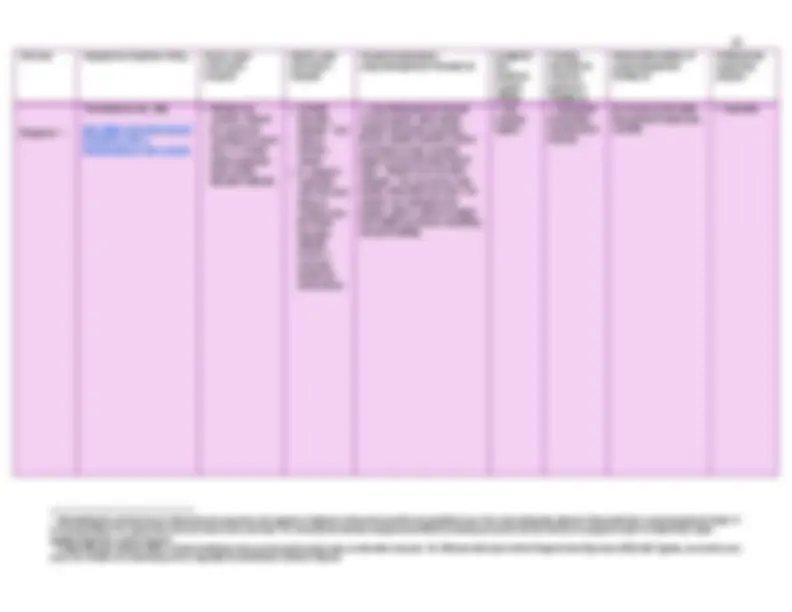
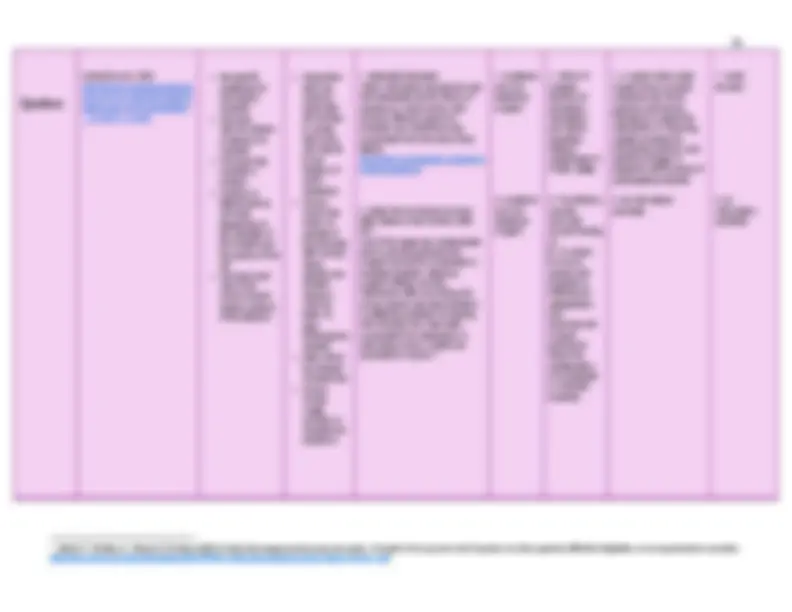
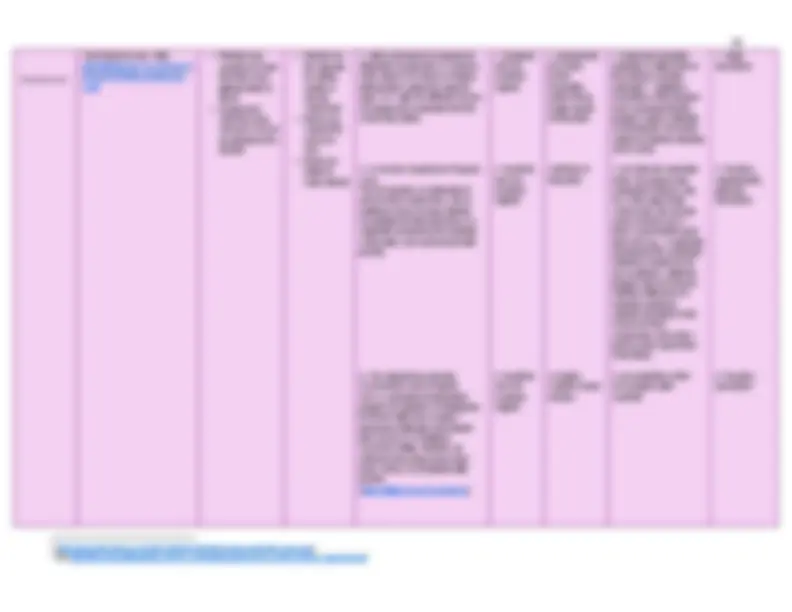
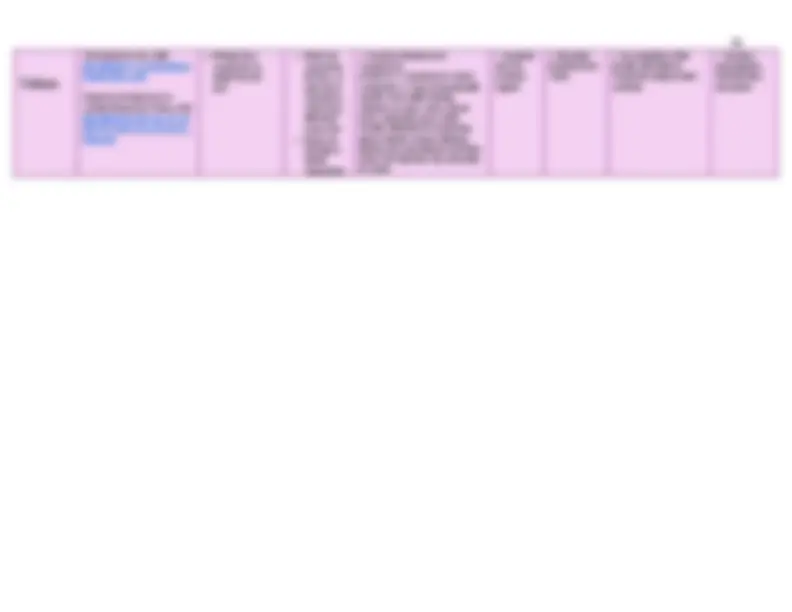


Study with the several resources on Docsity

Earn points by helping other students or get them with a premium plan


Prepare for your exams
Study with the several resources on Docsity

Earn points to download
Earn points by helping other students or get them with a premium plan
Community
Ask the community for help and clear up your study doubts
Discover the best universities in your country according to Docsity users
Free resources
Download our free guides on studying techniques, anxiety management strategies, and thesis advice from Docsity tutors
An inter-jurisdictional scan of school suspension and expulsion policies across Canada. It provides information on the authority of schools and districts to suspend or expel students, alternative education programs, academic and non-academic support offered, funding allocation, research and evaluation of programs, and professionals supporting the programs. The document covers each province and territory in Canada and includes information on their specific policies and programs related to school suspension and expulsion.
Typology: Study notes
1 / 20

This page cannot be seen from the preview
Don't miss anything!













Academic and non-academic supports
Funding allocation to program
Research / evaluation of program/approach/ framework
Professionals supporting the program
Interjurisdictional scan overview
Province Suspension/ Expulsion Policy School Level Authority to Suspend District Level Authority to Suspend Suspension/expulsion programs/approach/ frameworks Academic/ Non- academic support offered Funding allocation to program/ approach/ framework Research/evaluation of program/approach/ framework Professionals supporting program Alberta AB School Act, RSA 2000. http://www.qp.alberta.ca/1266.cf m?page=s03.cfm&leg_type=Acts &isbncln= Bill 10: An Act to Amend the Alberta Bill of Rights to Protect Our Children https://education.alberta.ca/medi a/158726/act_to_amend_the_alb erta_bill_of_rights_to_protect_our children.pdf Teacher may suspend from one class period Principal may suspend and reinstate students For suspensions over five days, principal must inform superintendent School board can expel student or reinstate **1****. Alternative Education._** AB schools provide Alternative Education sites that include some YMCA operated Alternative Suspension programs and some programs offered in the community^1.
2. Supporting Positive Behaviour. Similar to other school-wide proactive behavioural frameworks to address student behaviour, AB schools use positive behaviour support (PBS^2 ) approach to create learning environments where all students feel included, and have the opportunity to develop the skills and attitudes they need to be successful and engaged learners. At the core of a positive behaviour support approach are positive relationships, school-wide behavioural expectations, and positive reinforcement, fair and predictable consequences and direct and differentiated feedback to students about their behaviour. 1. Academic and non- academic support 2. Academic and non- academic support 1. Alberta Education 2. Alberta Education 1. No research could be located that highlighted the effectiveness of Alternative Education in AB schools. A national trial of YMCA Alternative Suspension programs across the country is currently underway, which includes sites in Edmonton, AB^3. 2. PBS has been evaluated extensively nationally and internationally for decades. 1. Teachers, administrators, guidance counsellors, youth workers. 2. School-wide staff (educators, administrators, counsellors, and educational assistants), parents, and community partners. (^1) An example of a community alternative education site for students 14-18 who have been suspended or expelled for drugs or alcohol http://www.cleanscene.ca/#!core-values-/c1oth (^2) Positive behavior supports (PBS), Effective Behaviour Supports (EBS), and School-wide Positive Behaviour Supports (SWPBS) are interchangeable terms for an approach found in current literature that enhances the capacity of schools to deal with behaviour issues and provide support to all students. Different provinces have adopted each approach slightly differently as highlighted throughout this document. (^3) http://www.publicsafety.gc.ca/cnt/rsrcs/pblctns/rslts-ltrntv-sspnsn-prgrm/index-eng.aspx).
Province Suspension/ Expulsion Policy School Level Authority to Suspend District Level Authority to Suspend Suspension/expulsion programs/approach/ frameworks Academic/ Non- academic support offered Funding allocation to program/ approach/ framework Research/evaluation of program/approach/ framework Professionals supporting program alResponsibilitySupportProgramGuid e.pdf
4. School-wide Positive Behaviour Support (SWPBS). SWPBS is a systems-level approach to creating a positive school environment that encourages prosocial interactions and allows effective instruction and learning to take place. A primary focus of SWPBS is on preventing problem behaviour through the implementation of evidence-based practices and continuous collection of data to guide decision making. 4. Non- academic support framework & academic support 4. BC Ministry of Education 4. The evidence base for SWPBS is vast and research shows that SWPBS is related to a range of positive student and teacher outcomes^6. An evaluation in BC in one school district showed positive results in schools implementing SWPBS. Evaluation of student outcomes showed a decrease in the level of office referrals and the number of students requiring additional behaviour support. Schools with better fidelity of implementation of SWPBS had higher academic achievement and rated their schools as safer than schools with low fidelity or district average^7. 4. Teachers, administrators, parents, students, in- school staff, community partners (^4) http://www.mcs.bc.ca/pdf/AlternateEducationFinal_web.pdf (^5) http://www.publicsafety.gc.ca/cnt/rsrcs/pblctns/rslts-ltrntv-sspnsn-prgrm/index-eng.aspx). (^6) See http://www.pbis.org/evaluation (^7) http://www.pbis.org/evaluation
Province Suspension/ Expulsion Policy School Level Authority to Suspend District Level Authority to Suspend Suspension/expulsion programs/approach/ frameworks Academic/ Non- academic support offered Funding allocation to program/ approach/ framework Research/evaluation of program/approach/ framework Professionals supporting program Manitoba The Public Schools Act (PSA), 2005. https://web2.gov.mb.ca/laws/stat utes/ccsm/p250e.php.; Bill 18 – The Public Schools Amendment Act (Safe and Inclusive School Act), 2013, was recently introduced to amend the PSA to reflect the realities of bullying and respect for human diversity. The Education Administration Miscellaneous Provision. Provides additional consideration with respect to http://www.edu.gov.mb.ca/k12/sp ecedu/aep/handbook_ss/regulati ons.pdf Safe and Caring Schools: Provincial Code of Conduct, 2014. The MB Provincial Code of Conduct is a ministerial directive intended to expand upon existing legislation and regulation for the purpose of strengthening school- wide approaches to preventing, intervening in, and responding to violence and other unacceptable student behaviour. http://www.edu.gov.mb.ca/k12/sa fe_schools/pdf/code_conduct.pdf Teacher may suspend from class for up to two days Principals can suspend for up to six weeks in districts without a superintendent In districts with a superintendent, principals can suspend for up to one week without district-level approval Board may suspend or expel Board may limit or place conditions on the teacher’s right to suspend In districts with a superinten- dent, the superintendent can suspend for a period of not more than six weeks
1. Alternative Suspension Program. School Districts in MB implement the YMCA Alternative Suspension Program, in-school suspension programs, and off-site alternative education programs. 2. Positive Behaviour and Intervention Support (PBIS)****. Many school districts in MB support the PBIS three-tiered model of prevention/intervention. PBIS is a systems change process for an entire school or district. The underlying theme is teaching behavioural expectations in the same manner as any core curriculum subject. http://www.edu.gov.mb.ca/k12/spece du/programming/behaviour.html 1. Academic and non- academic support 2. Non- academic support framework & academic support 1. Manitoba Education, Government of Manitoba (Public Safety), community partners 2. Manitoba Education 1. No evaluation of Alternative Education for districts in MB was available. 2. The evidence base for PBIS is vast and research shows that PBIS is related to a range of positive student and teacher outcomes^8. 1. Youth workers 2. PBIS teams can include teachers, administrators, support staff, special education teachers, parents, and community partners. (^8) http://www.pbis.org/evaluation
Province Suspension/ Expulsion Policy School Level Authority to Suspend District Level Authority to Suspend Suspension/expulsion programs/approach/ frameworks Academic/ Non- academic support offered Funding allocation to program/ approach/ framework Research/evaluation of program/approach/ framework Professionals supporting program respond to behaviour crisis and to limit suspensions (sections 6. and 6.6) http://www2.gnb.ca/content/dam/ gnb/Departments/ed/pdf/K12/poli cies-politiques/e/322A.pdf (^9) See http://www.gnb.ca/0000/publications/comm/inclusion.pdf
Province Suspension/ Expulsion Policy School Level Authority to Suspend District Level Authority to Suspend Suspension/expulsion programs/approach/ frameworks Academic/ Non- academic support offered Funding allocation to program/ approach/ framework Research/evaluation of program/approach/ framework Professionals supporting program Newfound- land / Labrador Schools Act, 1997****. An Act to revise the law respecting the operation of schools in the province. (http://www.assembly.nl.ca/legisl ation/sr/statutes/s12-2.htm) Department of Education’s Safe and Caring Schools Policy, 2007, Revised 2013. Provincial policy that gives schools and districts, in the development and maintenance of a safe, caring, and inclusive learning environment, to improve a variety of outcomes, including problematic behaviours. (http://www.ed.gov.nl.ca/edu/k12/ safeandcaring/policy.pdf). Teacher may suspend from class period Principal may suspend for a student for up to 30 days total for the entire school year All suspensions are reported to the Director Principals have authority to extend suspensions with approval from Director Director approves suspensions over 30 days Director can cancel or alter a suspension at any time
1. School-wide Positive Behaviour Supports (SWPBS). SWPBS is a decision-making framework, and it involves consistence practice for implementing a school’s code of conduct. Schools in NL are expected to implement SWPBS in their practice to help guide the selection, integration, and implementation of evidence-based academic and behavioural approaches to improve academic and behaviour outcomes for students. http://www.ed.gov.nl.ca/edu/k12/safe andcaring/procedure_1.pdf 2. YMCA Alternative Suspension****. Program in high schools offering support for students who have been suspended. Goals of program are to foster self-development and self- reliance in an environment that encourages self-esteem, acquisition of social skills, and promotion of self- respect and respect for others. 1. Non- academic support framework & academic support 2. Academic and non- academic support. 1. Government of Newfoundland & Labrador- Education 2. Department of Public Safety, & local United Way organizations 1. Extensive evaluation studies since 2006 ranging from RCTs to case studies^10 , with several studies reporting positive outcomes, including decreases in office referrals, aggressive and disruptive behaviours, and increases in prosocial behaviours, academic achievement, & emotion regulation. In NL, evidence from a case study in five schools found more success in elementary than secondary schools, given the significant challenges related to high-risk behaviours, attendance issues, and mental health in high schools. 2. Extensive evaluation including a national trial of the program currently underway^11. Preliminary evaluation includes positive changes in student attitudes, improved skills, fewer office referrals and disciplinary actions, reduction in recidivism. 1. School and district level educators, support workers, school administration, community professionals. 2. Youth workers (^10) Examples of evaluation studies of SWPBS include Waasdorp TE, Bradshaw CP, Leaf PJ (2012). The Impact of Schoolwide Positive Behavioral Interventions and Supports on Bullying and Peer Rejection: A Randomized Controlled Effectiveness Trial. Arch Pediatr Adolesc Med, 166,149-156. Bradshaw CP, Mitchell MM, Leaf PJ (2010). Examining the Effects of School-Wide Positive Behavioral Interventions and Supports on Student Outcomes: Results from a randomized controlled effectiveness trial in elementary schools. Journal of Positive Behavior Interventions, 12, 133-148. (^11) (http://www.publicsafety.gc.ca/cnt/rsrcs/pblctns/rslts-ltrntv-sspnsn-prgrm/index-eng.aspx).
Province Suspension/ Expulsion Policy School Level Authority to Suspend District Level Authority to Suspend Suspension/expulsion programs/approach/ frameworks Academic/ Non- academic support offered Funding allocation to program/ approach/ framework Research/evaluation of program/approach/ framework Professionals supporting program
4. Alternative Education and Transition Programs. http://southshorealternate.ednet.ns.ca / Exists for students who have not met with success in traditional junior or senior high school. 4. Academic and non- academic support
Department of Education included more positive and collegial environment among staff, fewer absentee days from staff, a higher level of student involvement in school life, and dramatic reductions in discipline referrals^13.
Province Suspension/ Expulsion Policy School Level Authority to Suspend District Level Authority to Suspend Suspension/expulsion programs/approach/ frameworks Academic/ Non- academic support offered Funding allocation to program/ approach/ framework Research/evaluation of program/approach/ framework Professionals supporting program Northwest Territories The Education Act, 1979. https://www.canlii.org/en/nu/laws/ stat/snwt-nu- 1995 - c- 28/latest/snwt-nu- 1995 - c-28.html Bill 12: An Act to Amend the Education Act, 2013 http://www.assembly.gov.nt.ca/ sites/default/files/13- 05 - 31bill12.pdf Principal may suspend not exceeding 20 school days Principal must notify the District Education Authority, school counsellor and superintendent of suspensions exceeding five days When a student is suspended more than once during the school year, a counsellor reviews the circumstances District Education Authority^14 may expel pending fair process
1. Effective Behavioural Support (EBS). Most schools in NT schools use EBS, or PBIS in which the school builds its own discipline system, as opposed to applying a pre-packaged program. EBS is a school-wide approach, which schools adopt as a preventive intervention that provides supports for students, including those who exhibit chronic behaviour problems. EBS elements can include social skills training, academic restricting, behavioural interventions, and school-wide goals, such as procedures for monitoring and record keeping, and teaching behavioural expectations directly to students. Especially relevant in schools in NT, EBS/PBIS is developed to be culturally responsive to Aboriginal students. https://www.ece.gov.nt.ca/files/Earl y- Childhood/Program%20Support% 0Guide%202008.pdf 1. Academic and non- academic support
Education, Culture and Employment Ministry.
Province Suspension/ Expulsion Policy School Level Authority to Suspend District Level Authority to Suspend Suspension/expulsion programs/approach/ frameworks Academic/ Non- academic support offered Funding allocation to program/ approach/ framework Research/evaluation of program/approach/ framework Professionals supporting program Ontario The Education Act, 1990 The Ontario Safe Schools Act: School Discipline and Discrimination http://www.ohrc.on.ca/sites/defaul t/files/attachments/The_Ontario_ Safe_Schools_Act%3A_School_ discipline_and_discrimination.pdf Principal must notify board supervisory officer of any suspension Principal may suspend to a maximum of 20 days School boards can expel a student (limited and full) Principals have authority for limited expulsions only If student is suspended the maximum days, or has multiple suspensions, a counsellor must review the case and inform the pupil/family of services to support the student
1. Alternative Education. Like most provinces, schools in ON implement Alternative Education (in- school or out of school sites) for students who have been suspended or expelled and have not been successful in traditional classroom settings. Some districts offer YMCA Alternative Suspension 2. Positive Alternatives to School Suspensions (PASS). This program is an alternative to home suspension and is offered to youth in elementary and secondary schools. The focus is on developing positive social and cognitive skills and to ensure that the student does not fall behind in their academics while serving their suspension. 3. Strict Discipline Programs. Strict Discipline Programs are in place for students who have been fully expelled to receive behavioural and academic interventions to help the pupil return to school and address the underlying issues that have led to their expulsion. Students can only return to an Ontario school if he or she successfully completes a strict discipline program or satisfies the objectives of the program. 1. Academic and non- academic support. 2. Academic and non- academic support 3. Academic and non- academic support 1. Ontario Ministry of Education 2. Ontario Ministry of Education 3. Ontario Ministry of Education 1. Extensive evaluation including a national trial of the program currently underway^18. Preliminary evaluation includes positive changes in student attitudes, improved skills, fewer office referrals and disciplinary actions, reduction in recidivism. 2. Program evaluation conducted by Rebound Child and Youth Services Inc (http://www.excellenceforch ildandyouth.ca/sites/default/ files/gai_attach/PEG- 236_Final_Outcomes_Rep ort.pdf). 3. No research on the Strict Discipline programs was available. 1. Teachers, administrators, youth workers, educational assistants, community partners 2. Police services, community partners, youth workers 3. Teachers, administrators, youth workers, educational assistants (^18) (http://www.publicsafety.gc.ca/cnt/rsrcs/pblctns/rslts-ltrntv-sspnsn-prgrm/index-eng.aspx).
Province Suspension/ Expulsion Policy School Level Authority to Suspend District Level Authority to Suspend Suspension/expulsion programs/approach/ frameworks Academic/ Non- academic support offered Funding allocation to program/ approach/ framework Research/evaluation of program/approach/ framework Professionals supporting program
PEI School Act, 1993 http://www.gov.pe.ca/law/statutes /pdf/s-02_1.pdf A teacher may suspend for up to one half instructional day Principal or superintendent may suspend without notice to the board for up to five days Superintendent reports to the board Board may suspend or expel
1. Alternative Education. Alternative Education in PE is focused around having students continue with their studies away from the traditional classroom setting, but to return them to regular school programming as soon as possible. 2. Provincial Adolescent School (PAS). A unique alternative education site for students who are residents of the Provincial Adolescent Group Home and are unable to attend their home school. The PAS also provides direct service to a small number of day students who present with extreme behavioural difficulties and have exhausted school/school board resources. http://www.gov.pe.ca/photos/original/ ed_prov_adoles.pdf 1. Academic and non- academic support 2. Academic and non- academic support 1. Department of Education, Early Learning and Culture 2. Department of Education & Department of Family and Human Services, Department of Social Services and Seniors 1. Alternative education evaluations in PE schools were not available. 2. No evaluations of the PAS were available. 1. Teachers, educational assistants. 2. Teachers and youth workers.
Saskatchewan The Education Act, 1995. http://www.qp.gov.sk.ca/documen ts/English/Statutes/Statutes/E0- 2.pdf Principal may suspend not more than three days without notice to Board Suspensions more than days and up to 10 must be reported to the Director Director has the authority to confirm, modify or remove suspension Board may suspend for up to one year Board has power to expel student
1. YMCA Alternative Suspension. Alternative Suspension is a resource at the disposal of schools in Regina, offering them support for students aged 12-17 who, for different reasons are temporarily suspended from the school they attend. 2. In-School Suspension Program (ISS)****. The ISS provides an alternative to out-of-school suspensions, and an additional means to keep students accountable for their behaviour, in a supportive environment to complete school work, and communicate with parents. 3. The Supportive Learning Environment (SLE) Program. SLE is a behavioural intervention program for students in Kindergarten to Grade 8 with more complex behavioural difficulties that impede their success in a traditional classroom setting. Students are referred to the program from their home school, in consultation with parents. (https://www.rcsd.ca/?q=node/41) 1. Academic and non- academic support 2. Academic and non- academic support. 3. Academic and non- academic support 1. Government of Canada (Crime Prevention Action Fund), Regina Board of Education 2.Ministry of Education 3. Regina Catholic School Division 1. Extensive evaluation including a national trial of the program currently underway^20. Additional evaluations of the program have concluded that the program model is effective in reducing the risk factors related to students dropping out of school. 2. An extensive evaluation of the ISS program was conducted in Moose Jaw, SK, in the largest high school in the city over the course of three years^21. Many school-related goals were met (e.g., a supportive environment for suspended students), despite day-to- day roadblocks. While the program did not show any statistical differences in reducing recidivism, students did reflect on the reasons for their suspensions and made a plan to avoid suspensions in the future. 3. No evaluations of the SLE program were available. 1. Youth counsellors 2. Teachers, administrators, guidance counsellors. 3. Teachers, counsellors (^20) (http://www.publicsafety.gc.ca/cnt/rsrcs/pblctns/rslts-ltrntv-sspnsn-prgrm/index-eng.aspx). (^21) See http://www.mcdowellfoundation.ca/main_mcdowell/projects/research_rep/36_inschool_suspension.pdf
The Education Act, 2002 http://www.gov.yk.ca/legislation/a cts/education_c.pdf Progressive Response to Student Behaviour Policy, 2012 http://www.education.gov.yk.ca/p df/Draft_Progressive_Response_ Policy.pdf Principal may suspend for no longer than ten days Board can suspend for ten days, or until end of semester or school year, whichever comes first Board can reinstate or uphold suspensions
1. Positive Alternative to Suspension. Schools in YT provide for in-school suspension as a way for dealing with specific issues while keeping students at school. Some schools have a dedicated space called Positive Alternative to Suspension, where students receive individual tutoring and counselling to meet their needs and help them stay connected to school. 1. Academic and non- academic support 1. Education- Government of Yukon 1. No evaluations of the positive alternative to suspension program were available. 1. Teachers, youth workers, administrators, counsellors